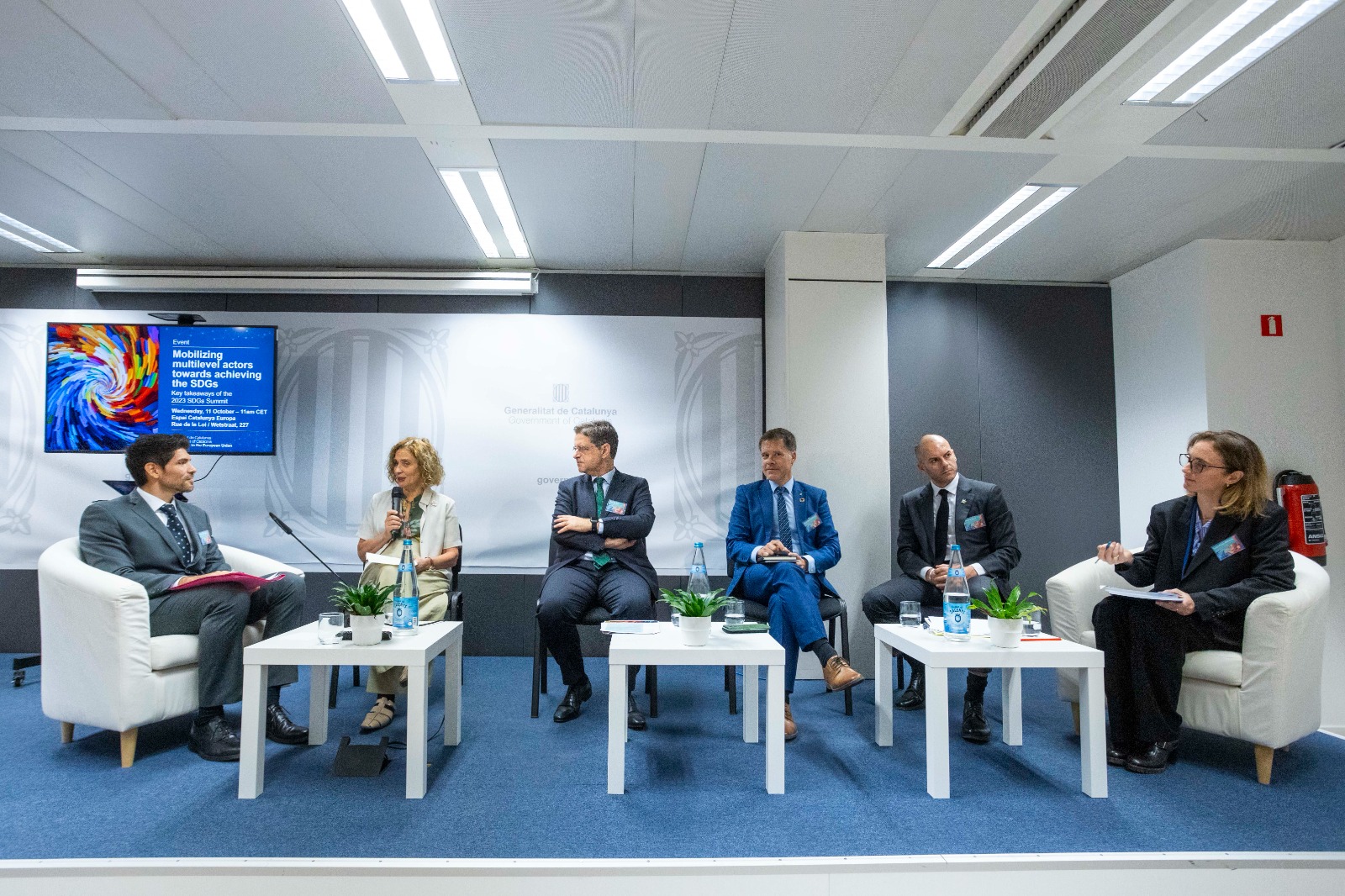- The event, organized by the Catalan Government Delegation to the EU, has seen the participation of representatives from local, European, and international institutions
- Arnau Queralt i Bassa presented the process of preparing the voluntary report on the implementation of the 2030 Agenda in Catalonia

The Delegation of the Government of Catalonia to the EU hosted an event on October 11 to discuss the challenges and opportunities of implementing the Sustainable Development Goals (SDGs). The event, titled 'Mobilizing Multilevel Actors to Achieve the SDGs: Lessons Learned from the 2023 SDG Summit,' featured the participation of Arnau Queralt i Bassa, Director of the Advisory Council for Sustainable Development of Catalonia, and various representatives from international, European, and regional institutions.
One of the key actors in the implementation of the SDGs will be local and regional governments, and therefore, coordination among all institutions is crucial for proper and effective execution. In this regard, the event organized by the Government was a key platform for providing visions and experiences of multilevel actors in the implementation of the goals, in a significant year when the 2nd SDG Summit was held in New York. The forum was inaugurated by Ignasi Centelles, the Representative of the Government of Catalonia to the EU, reaffirming Catalonia's and its society's commitment to developing multilevel strategies for SDG implementation. This commitment is evident through various initiatives undertaken with the involvement of the Government and collaboration with the United Nations, such as the Giga center in Barcelona to connect schools worldwide and the UN pilot program in the Terres de l'Ebre region to assess its resilience to global challenges.
Arnau Queralt i Bassa, on the other hand, presented the process of preparing the voluntary monitoring report on the implementation of the 2030 Agenda (VLR) in Catalonia, a tool that, upon completing this process, will be used to track the progress of the Sustainable Development Goals in the country. In this regard, Queralt-Bassa emphasized the importance of the entire society participating in this process, as well as the need to create stronger alliances between governments and local authorities to promote coordinated multilevel action. "We need to mobilize the population. We need resources and make it happen. In our Voluntary Local Review (VLR), we asked all actors involved in the SDGs and civil society how Catalonia is achieving the goals," stated the Director of the Advisory Council for Sustainable Development of Catalonia.
Giving a voice to all institutions, a key factor
Representatives of local, European, and international institutions participating in the debate also expressed their views on the involvement of institutions closer to citizens in the implementation of the SDGs. Camilla Brückner, Director of the United Nations Office in Brussels and United Nations for Development in the EU, highlighted the crucial role of local and regional governments in advancing the UN's set goals. Specifically, Brückner stated that these actors are "an essential link in the chain of ownership and trust between multilateral institutions and the people we serve." In addition, the UN representative in Brussels emphasized the SDG Summit in New York as a key milestone in SDG implementation.
Other speakers expressed similar sentiments. Eeva Furman, member of the Advisory Council of the European Sustainable Development Network and a prominent expert at the Prime Minister's Office of Finland, pointed out that the SDGs cannot be achieved "without everyone being involved."Fabrizio Rossi, Secretary-General of the Council of European Municipalities and Regions, noted that 65% of the SDGs will depend on local and regional levels for their implementation. In this regard, Rossi emphasized the need for "greater political dialogue" because "territories need the SDGs, but these would not exist without regions and people and cities."
Repositioning sustainable development at the center
The crises that have affected the international landscape in recent years have also influenced some of the interventions. Laia Pinós, Deputy Head of the European Green Deal Unit at the European Commission, stated that "progress has only been made on 12% of the SDGs," a situation that, she believes, needs to be reversed by continuing progress in their implementation after crises such as Ukraine or COVID-19, which she believes have hindered progress towards the 2030 horizon. She also emphasized the importance of the EU's Voluntary Review, presented at the summit held in New York. Giving voice to local governments, Ricardo Rio, Mayor of Braga and SDG Rapporteur for the Committee of the Regions, stressed the "need to accelerate work to achieve the Sustainable Development Goals." He also highlighted the key importance of providing tools to cities and allocating more resources to "improve what they are already doing to achieve the SDGs."
Davide Strangis, Deputy Secretary-General of the Conference of Peripheral Maritime Regions, a network of which Catalonia is a member, moderated the event. Strangis asked national governments to have "a long-term perspective beyond responses to climate change." At the same time, he emphasized the importance of empowering regions in the implementation of the SDGs.